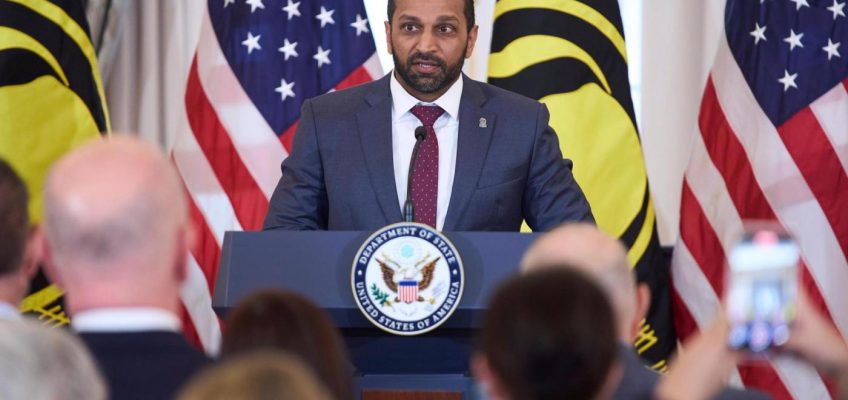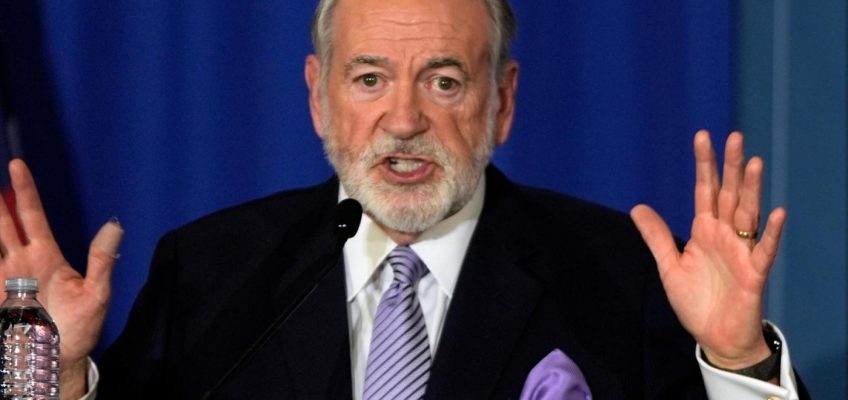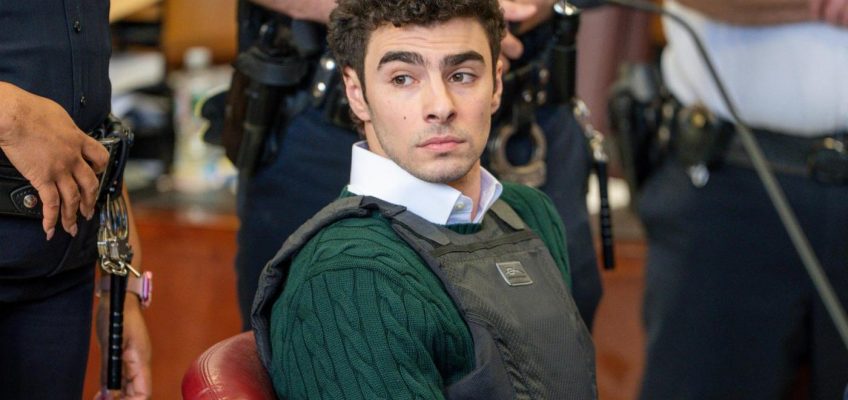By DANICA KIRKA, Associated Press
NUUK, Greenland (AP) — Lisa Sólrun Christiansen gets up at 4 a.m. most days and gets to work knitting thick wool sweaters coveted by buyers around the world for their warmth and colorful patterns celebrating Greenland’s traditional Inuit culture.
Her morning routine includes a quick check of the news, but these days the ritual shatters her peace because of all the stories about U.S. President Donald Trump’s designs on her homeland.
“I get overwhelmed,’’ Christiansen said earlier this month as she looked out to sea, where impossibly blue icebergs floated just offshore.
The daughter of Inuit and Danish parents, Christiansen, 57, cherishes Greenland. It is a source of immense family pride that her father, an artist and teacher, designed the red-and-white Greenlandic flag.
“On his deathbed he talked a lot about the flag, and he said that the flag is not his, it’s the people’s,” she said. “And there’s one sentence I keep thinking about. He said, ‘I hope the flag will unite the Greenlandic people.’’’
Island of anxiety
Greenlanders are increasingly worried that their homeland, a self-governing region of Denmark, has become a pawn in the competition between the U.S., Russia and China as global warming opens up access to the Arctic. They fear Trump’s aim to take control of Greenland, which holds rich mineral deposits and straddles strategic air and sea routes, may block their path toward independence.
Those fears were heightened Sunday when Usha Vance, the wife of U.S. Vice President JD Vance, announced she would visit Greenland later this week to attend the national dogsled race. Separately, National Security Adviser Michael Waltz and Energy Secretary Chris Wright will visit a U.S. military base in northern Greenland.
FILE – Usha Vance attends a campaign rally, Nov. 1, 2024, in Selma, N.C. (AP Photo/Allison Joyce, File)
The announcement inflamed tensions sparked earlier this month when Trump reiterated his desire to annex Greenland just two days after Greenlanders elected a new parliament opposed to becoming part of the U.S. Trump even made a veiled reference to the possibility of military pressure, noting the U.S. bases in Greenland and musing that “maybe you’ll see more and more soldiers go there.”
News of the visit drew an immediate backlash from local politicians, who described it as a display of U.S. power at a time they are trying to form a government.
“It must also be stated in bold that our integrity and democracy must be respected without any external interference,” outgoing Prime Minister Múte Boroup Egede said.
Greenland, part of Denmark since 1721, has been moving toward independence for decades. It’s a goal most Greenlanders support, though they differ on when and how that should happen. They don’t want to trade Denmark for an American overlord.
The question is whether Greenland will be allowed to control its own destiny at a time of rising international tensions when Trump sees the island as key to U.S. national security.
David vs. Goliath
While Greenland has limited leverage against the world’s greatest superpower, Trump made a strategic mistake by triggering a dispute with Greenland and Denmark rather than working with its NATO allies in Nuuk and Copenhagen, said Otto Svendsen, an Arctic expert at the Center for Strategic and International Studies in Washington.
Trump’s actions, he says, have united Greenlanders and fostered a greater sense of national identity.
People listen speeches of candidates for upcoming parliamentary elections in Nuuk, Greenland, Tuesday, March 5, 2025. (AP Photo/Evgeniy Maloletka)
“You have this feeling of pride and of self-determination in Greenland that the Greenlanders are not, you know, cowed by this pressure coming from Washington,” Svendsen said. “And they’re doing everything in their power to make their voices heard.”
Denmark recognized Greenland’s right to independence at a time of its choosing under the 2009 Greenland Self-Government Act, which was approved by local voters and ratified by the Danish parliament. The right to self-determination is also enshrined in the United Nations charter, approved by the U.S. in 1945.
U.S. national security
But Trump is more focused on the economic and security needs of the U.S. than the rights of smaller nations. Since returning to office in January, he has pressured Ukraine into giving the U.S. access to valuable mineral resources, threatened to reclaim the Panama Canal and suggested that Canada should become the 51st state.
Now he has turned his attention to Greenland, a territory of 56,000 people, most from indigenous Inuit backgrounds.
Passengers ride on a boat outside of Nuuk, Greenland, Thursday March 6, 2025. (AP Photo/Evgeniy Maloletka)
Greenland guards access to the Arctic at a time when melting sea ice has reignited competition for energy and mineral resources and attracted an increased Russian military presence. The Pituffik Space Base on the island’s northwest coast supports missile warning and space surveillance operations for the U.S. and NATO.
Before Trump’s re-election, Greenlanders hoped to leverage this unique position to help the country achieve independence. Now they fear it has made them vulnerable.
Cebastian Rosing, who works for a water taxi firm that offers tours around the Nuuk fjord, said he’s frustrated that Trump is trying to take over just as Greenland has begun to assert its autonomy and celebrate its Inuit origins.
“It’s so weird to defend (the idea) that our country is our country because it’s always been our country,” he said. “We’re just getting our culture back because of colonialism.”
Strategic importance
It’s not that Greenlanders don’t like the U.S. They have welcomed Americans for decades.
The U.S. effectively occupied Greenland during World War II, building a string of air and naval bases.
Passengers walk on a pier after arriving in Kapisillit village in Greenland, Thursday, March 6, 2025. (AP Photo/Evgeniy Maloletka)
After the war, President Harry Truman’s government offered to buy the island because of “the extreme importance of Greenland to the defense of the United States.” Denmark rejected the proposal but signed a long-term base agreement.
When Trump resurrected the proposal during his first term, it was quickly rejected by Denmark and dismissed as a headline-grabbing stunt. But now Trump is pursuing the idea with renewed energy.
During a speech earlier this month he told a joint session of Congress that the U.S. needed to take control of Greenland to protect its national security. “I think we’re going to get it,” Trump said. “One way or the other.”
A model in the Marshall Islands?
Even so, Trump has his admirers in Greenland.
And there is no greater fan than Jørgen Boassen. When he spoke to The Associated Press, Boassen wore a T-shirt featuring a photo of Trump with his fist in the air and blood streaming down his face after an assassination attempt last year. Underneath was the slogan, “American Badass.”
Boassen works for an organization called American Daybreak, which was founded by former Trump official Thomas Dans and promotes closer ties between the U.S. and Greenland.
The former bricklayer, who describes himself as “110%″ Inuit, has a litany of complaints about Denmark, most stemming from what he sees as mistreatment of local people during colonial rule. In particular, he cites Inuit women who say they were fitted with birth control devices without their permission during the 1970s.
Trump must act to secure America’s back door, Boassen says, because Denmark has failed to guarantee Greenland’s security.
But even he wants Greenland to be independent, a U.S. ally but not the 51st state.
What he has in mind is something more like the free-association agreement the Marshall Islands negotiated with the U.S. when it became independent in 1986. That agreement recognizes the Pacific archipelago as a sovereign nation that conducts its own foreign policy but gives the U.S. control over defense and security.
“We’re in 2025,’’ Boassen said. “So I don’t believe they can come here and take over.”
Whatever happens, most Greenlanders agree that the island’s fate should be up to them, not Trump.
“We have to stand together,’’ Christiansen said, her knitting needles clicking and clacking.
This story, supported by the Pulitzer Center for Crisis Reporting, is part of an ongoing Associated Press series covering threats to democracy in Europe.




